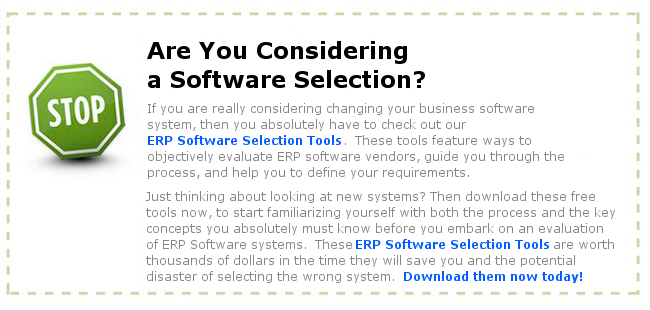By Andrew Karasev
As seeing large number of implementations in our case these are Microsoft Business Solutions Products: Great Plains, MS CRM, Navision we would like to give you our opinion on what should you consider to do to secure implementation success. These principles should work as for large corporation as well as for midsize and even small business. We will not be talking about old-wisdom, which you know from the college classes or business school about management and staff involvement into the decision making, brainstorming, etc. we’ll be ERP specific
* In-house Technical Expertise. Well, complication of computer networking and its security, plus the fact that SQL is now standard for the database platform (Microsoft SQL Server, Oracle, DB2, etc.), plus internet connection line and its support make it inevitable to have IT expertise in the company this might be the whole department or just coming or part time networking consultant. Our experience indicates that the lack of internal or always available onsite specialist decreases the chances of success dramatically. And the explanation should be simple to this fact. Nowadays ERP system requires minor or major customization, integration and reporting and all these steps in turn require patient coding and testing in the test environment or on the sample dataset/database
* Dedicated ERP Administrator. This is true that users could be trained and would know how to use the system. However typical ERP has its own life and somebody should assign new users, setup security roles for them, modify reports and makes custom reports available for the users, setup printers, try first to resolve the issue by looking at the techknowledge database, and so on. ERP Administrator doesn’t have to be IT guru she/he needs to be trained on how to administer the program and how to deal with technical support. Image for a moment that if you take out manager from the company even if all the employees have excellent training and used to work for the company numerous years you will still expect performance degradation. The same should be said about ERP system
* Expect Certain Number of Issues. IT industry is not yet mature and it is probably sad, but the reality, that even very experienced consultant, developer, programmer makes errors or your software environment has something that make the custom piece malfunction. When you see the consultant being persistent in resolving your issues please be patient and try to help him or just don not make him nervous.
* Trust Your Consultant. When you decide on somebody to implement the system, you need from this moment on to trust him and let him have high security access to the ERP hosting server. Complex security makes consultant suffer from getting connected, installing the patches or custom pieces. So many times we were spinning our wheels in trying to test new custom business logic, when, say Windows or MS SQL Server security was restricting us to do the actions we needed
* Do Not Overnegotiate. This is from the sales cycle. When you purchase the system you should purchase the software and implementation from the same company otherwise your partner will place you on the second priority list. We saw numerous examples, when client purchases Microsoft CRM licenses from nation-wide distributor, and then is trying to find somebody to implement the system. Also if you are cutting software prices you may see your consulting company rescheduling the work for you in favor of somebody else.
Andrew Karasev is Chief Technology Officer at Alba Spectrum Technologies ( http://www.albaspectrum.com ) – Microsoft Business Solutions and IBM Lotus Domino Partner, serving corporate customers in the following industries: Aerospace & Defense, Medical & Healthcare, Distribution & Logistics, Wholesale & Retail, Chemicals, Oil & Gas, Placement & Recruiting, Advertising & Publishing, Textile, Pharmaceutical, Non-Profit, Beverages, Conglomerates, Apparels, Durables, Manufacturing and having locations in multiple states and internationally.
Article Source: http://EzineArticles.com/

